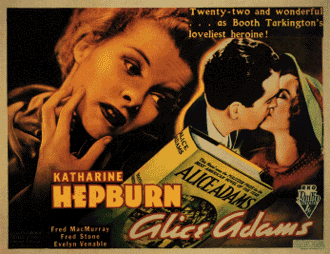
ALICE ADAMS
US, 1935, 99 minutes, Black and white.
Katharine Hepburn, Fred Mac Murray, Evelyn Venable, Frank Albertson, Fred Stone, Ann Shoemaker, Charles Grapewin, Grady Sutton, Hedda Hopper, Hattie Mc Daniel.
Directed by George Stevens.
Alice Adams was an early Katharine Hepburn vehicle. She had won an Oscar in 1933 for Morning Glory. She was one of the leading actresses at R.K.O. and Alice Adams was the beginning of a number of successful films, critically speaking, but which eventually caused her to be called 'box office poison' because of some lack of popularity in cinemas. She followed this film with such features as Mary of Scotland, Quality Street, Stage Door, Bringing Up Baby. After her success on stage in The Philadelphia Story she returned to Hollywood and to a successful career at M.G.M. She is excellent in the central role of the ordinary American girl of the small town from Booth Tarkington's story. Fred Mac Murray is amiable in the role of the hero. There is an excellently humorous sequence with Hattie Mc Daniel as a gum-chewing awkward cook. Direction is by George Stevens, at the beginning of his career. He was to make many successful films including Gunga Din, The More The Merrier, his Oscar-winning A Place In The Sun and Giant. The film is very dated now but its picture of an ordinary young girl and her hopes and ambitions has a universal value.
1. The success of the film as a Katharine Hepburn vehicle? Its '30s style and qualities? Its popularity in its time? Illustrating the cinema of the '30s?
2. The film as a piece of Americana - small town, ordinary people, romantic themes, worries, hopes and ambitions? The insights of Booth Tarkington about American small towns? Class. poverty, wealth.. snobbery? The shops. work, home. dances? Black and white photography,. studio sets, score?
3. The universality of the appeal of the basic themes and characters, despite the style being dates?
4. The audience getting to know Alice immediately with her trying to buy the flowers in the opening sequences, taking them from the park? The discussion about her dress, going to the dance? Her place in the family, in the town, with other girls? Her love for her father and his invalid status? Her mother and her carping criticisms? Her brother and depending on him for being squired to dances etc.? Family tensions? Possibilities? The building up of detail to give a picture of the family? Conventional presentation but true?
5. The dance and her presence, her dress, comparison with the other girls, her lack of dancing partners? Her brother and his gambling? The encounter with the eligible young man and dancing with him? Her over-talkativeness? Her getting him to find her brother and the humiliation of his gambling?
6. Alice's trying to cope with living life in a small town? Her ambitions as seen in her walking through town, encounters with people in the shops, her having to get a secretarial job? The irony of her meeting the young man ?her walking with him, her prattling about her father needing a secretary, her dancing skills and her talents. her quoting Shakespeare ? wrongly? Walking him past the house? Enjoyment of the outings with him? Avoiding inviting him to the house? The inevitable visit? The embarrassment of the dinner sequence? The arguments in the house and her fear of losing him?
7. How well staged was the comedy of the dinner - the audience's edge with the family about the visit, the poor meals and their pretensions? The comedy of the cook and her haphazard way of doing things?
8. The background issues of industry, money, inventions, patents, hopes? The setting up of the firm? The partner's thinking it a betrayal? The discussions in the wealthy home? The truth emerging?
9. The young man and his asking about Alice, hearing society views about her, about dishonesty? His attitudes in coming to the dinner?
10. The revelation of the truth, Alice and her having to be honest? Her discovering that the man had not gone away ? and the possibility of a happy ending and a future? Based on the truth?
11. A gently satiric and authentic picture of hopes, ambitions, love, worries, resolution?